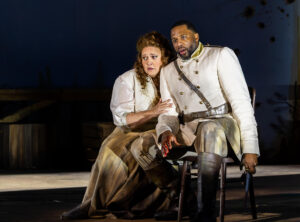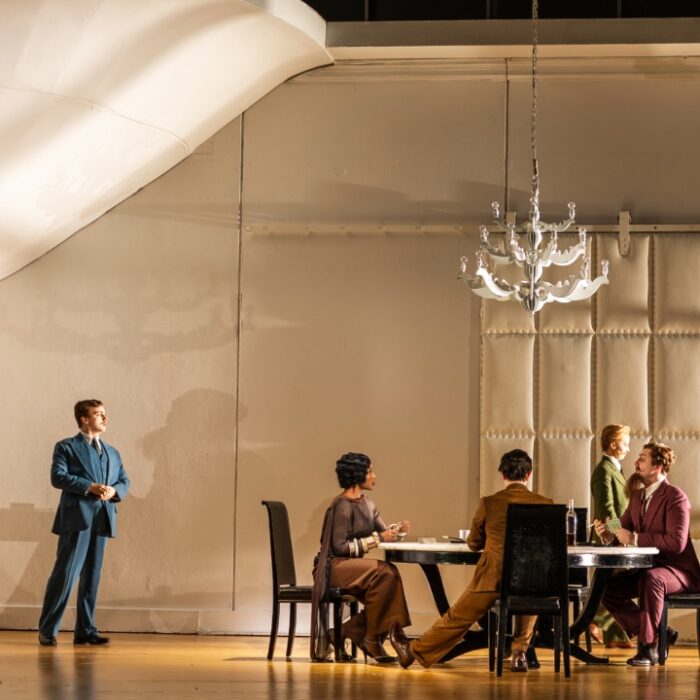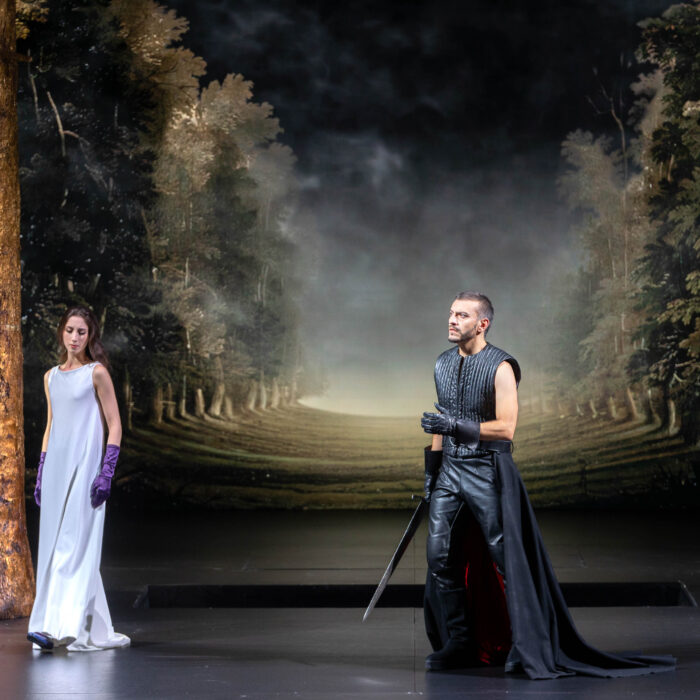
Boston Lyric Opera 2025-26 Review: Macbeth
By João Marcos Copertino(Credit: Nile Scott Studios)
I get it. Making opera in this day and age, in America, is not for amateurs. It is a tough business, with very little governmental support — unlike most countries in the world. That said, with all the sympathy due the Boston Lyric Opera (BLO) as an institution and the artists of this performance, I cannot, in good conscience, write that their season-opening production of Verdi’s “Macbeth” was a proper way to celebrate Verdi’s two-hundred-and-twelfth birthday.
The main problem is evident. Even though arts administration in America is very hard — funds are scarce, pressures plentiful — lack of means cannot excuse lack of artistic sensibility. Despite the eventual correctness in some aspects of the opera, the executive decisions made were inexcusable — from improper casting to a complete disregard for operatic theater.
David Angus, in a public conversation a few weeks ago, assured operagoers that director Steve Maler was genuinely knowledgeable about Shakespeare’s work. That might be true, but he certainly knows very little of Verdi, Piave, and Maffei’s “Macbeth.” The scenic direction was an uncomfortable mix of confusion, ugliness, and inconsistent dramaturgy.
Verdi’s “Macbeth” is one of his most misunderstood operas. Matthew Aucoin himself wrote that he sees it as a minor work. I disagree. It is actually a brilliant work, and one of Verdi’s most theatrical operas. There might be a good “Il Trovatore” or even “Aida” with bad acting and good singing, but there cannot be a poorly acted “Macbeth” that sounds good. One is intimately connected to the other. But it is not just any kind of acting that works in “Macbeth.” Nobody expects the protagonists to be Meryl Streeps and Al Pacinos of the lyric arts. They must sing the roles with a certain sense of bravura, a sort of spitefulness, in which all of the characters’ psychological development, from fierce
ambition to guilty madness, is visible and compelling. The Macbeth and Lady Macbeth of the first act cannot be the same as those in the fourth act — unlike any Leonora or Aida, who can remain tragic victims of circumstance throughout an opera without any psychological depth.
Maler’s reading of the play ignores all of this. His Macbeths have no evil instinct: they see themselves as victims of the plot from the start. It is almost impossible to believe that they ever had any guile or ambition at all. It was also evident that the singers had no direction on the matter. Norman Garrett went full Norma-Desmond-waiting-for-his-close-up at the end of the second act, only to return as the most sober and noble human being on earth in Acts Three and Four. Alessandra LoBianco moved in the sleepwalking scene as if she were singing the mad scene of “Lucia di Lammermoor” — she even danced to the orchestra’s music, showcasing her deep misunderstanding of the character in question. The ending of “Macbeth,” one of the most sinister and nocturnal of Verdi’s career, became a moment of brightness, as if evilness had been vanquished, and no trauma from the story’s violence loomed over the opera. Everyone was happy and cheering as if they were singing the joyful chorus of “Fidelio’s” finale. How can an opera stage director be so numb to one of Verdi’s most eloquent orchestrations? Had he ever listened to the opera before staging it?
The art direction was also particularly bad, but that seems to be a intrinsic problem at BLO. A few months ago, at their production of a Vivaldi “jukebox” opera, “The Four Seasons,” I was impressed by a set that was simple but compelling, trusting more in good lighting work than artificial, poorly crafted walls. Imagine my surprise when the company asked reviewers not to write about the opera because the sets were not ready in time for the premiere! This “Macbeth” made it evident that no set at all is better than a bad one. The stage was transformed into a dirty-walled acoustic shell that nevertheless failed to sufficiently lift the singers’ voices. The walls were dirty for no reason, like the costumes. In the post-apocalyptic staging no message could be inferred. The lighting was unimaginative. At no moment was the stage as dark as Verdi wanted (he was very specific about the nocturnal aspect of his opera when preparing the Parisian premiere, as one can read in his letters). Even in moments when darkness is essential — the entire Duncan death scene; the “Patria oppressa” chorus; or in the sleepwalking scene where just a candle is necessary, the stage was too bright because of the white-walled sets and the lighting designer’s apparent fear of darkness.
Angus’ music direction was, at best, problematic, but still entertaining. On the one hand, Angus is rather efficient in circumventing adversities with seamless speediness: Garrett entered for his first scene before the orchestral introduction and Angus managed to hide the mistake. It was so subtle that I wondered if he had cut some parts of the score or used the 1847 edition — which later investigation proved was not the case. Angus is also very careful to make the orchestra work for the opera, not the opposite. Singers were never covered by Verdi’s brassy orchestral texture. Yet many moments were too fast for their own good — the classic first act finale, for example — and the orchestra played far out of tune. The strings were never together, neither in pitch nor rhythm. The trumpets at the end of the opera were painfully out of tune, playing a cacophony that sounded like nothing ever composed in the nineteenth century. Nobody expects the BLO to play like the BSO (Boston Symphony Orchestra), but still…
With all due respect, Norman Garrett does sound like an appropriate Macbeth, albeit a bit of a sentimental one. While he encountered a bit of difficulty in the higher range during his stage entrance, he has a very uniform sound and much command of the Italian text. He was a bit misdirected. It is certain that he must have had a lot of fun being nuts in the banquet scene, but he went so over the top that it hindered his performance when he had to be noble and poised in the third and fourth act. In fact, there is something very original in his take on the character. His Macbeth is heroic — a tragic hero with a soul so soulful it seems unimaginable he once acted so wickedly. When he sings “morte” in the scene preceding the final battle, it sounded more like a Manrico “All’armi” than a madman guiding the fools. There was, however, no chemistry between Garrett and Alexandra LoBianco. Even in operatic terms, it is possible to display a certain kind of intimacy, but that did not happen. In more than a few instances it felt as if Garrett was running away from the congenial LoBianco instead of seeking her. When he was singing with her — especially the duos “Fatal mia donna!” and “Ora di morte” — it was evident that Garrett’s homogenous voice did not blend with LoBianco more heterogenous vocal material. His solos, especially in the third and fourth acts, were significantly better.
After a long stage hiatus because of a dramatic vocal injury, Alexandra LoBianco returned to the spotlight with this performance of Lady Macbeth. On the one hand, it is commendable that the soprano has been so open about her vocal conditions, especially considering that her problems occurred just as it seemed that her career was reaching all-new heights. On the other, I am very certain that Lady Macbeth is not a role that suits her stage personality and vocal abilities. Even several years ago I did not classify LoBianco as a belcantista. In fact, in spite of advertising herself as a dramatic soprano, LoBianco, at her best, sang verismo repertoire. It is true that Verdi, in the first version of the opera — in Florence — wanted a soprano that did not have an angelic voice. However, taking into consideration how much the role changed in the second version, we must bear in mind that Lady Macbeth is no Santuzza. From what I heard last night, LoBianco did not have this “mid-nineteenth century” quality when tackling the role. She does not have any of the thrilling coloraturas for the toast scene and the cabalettas — in fact they sound almost like a glissando. Her head resonance is significantly clearer and lighter than one would like in moments like “La luce langue,” and she could not sing that “fil de voce” high D-flat in her farewell to the stage in “Una macchia è qui tutt’ora.” On top of that, LoBianco is perhaps too generous with Lady Macbeth to allow the character to become anything but a sweet heroine. While a soft-hearted Turandot might be interesting, a too sweet and meek Lady Macbeth is not. What LoBianco does offer in her voice now that she did not before is an uncannily loud and detached chest voice — which is something that many think essential for the role. She does use it a bit too much, even in notes that are borderline in the midrange, and the heterogeneity of the registers, in LoBianco’s case, adds little to the drama, revealing no sense of evilness whatsoever.
The casting was much more successful in the secondary parts. Zaikuan Song was a particularly moving and proper Banquo. It is an ungrateful role to sing, I must say. Verdi did not give to Bunquo enough material. But he is essential for making the first two acts work. The magnificent finale of the first act cannot work without a very somber “qual orrenda notte.” Song has a particularly youthful bass voice that makes the role much more believable. And when he uttered “terror” in the end of his second act aria, I melted for him.
Even more appealing was David Junghoon Kim’s Macduff. Clearly a spinto tenor with much sense of Italian style, he has so much of that sense that it almost felt too much in the context of this production. His midrange has that brilliant drastic break that makes all the difference. And it was evident, at least to me, that, when he finished singing “O figli miei!… Ah, la paterna mano” Kim received the most genuine ovation of the night. On the occasion of the opera’s Parisian premiere, Verdi suggested having Macduff instead of Lady Macbeth sing the toast scene in the second act. Ultimately Verdi had his reasons to keep Lady Macbeth in that aria, but, in this production, I wished that the switch had been made.
Omar Najmi did not seem to be in his best health when singing Malcolm. He did not resonate as well as Junghoon Kim, but still, among all the scenic problems at the end of the opera, not hearing the voice of the new king of Scotland was not the biggest of them.
It was very nice that the role of Duncan was performed by Léon Jerfita, a professional deaf actor. In fact, one of the interesting touches of BLO is their commitment to making opera accessible for hard-of-hearing operagoers.
It is with a dagger in my heart that I write this review. As I said, I cannot imagine how complex opera production in Boston must be nowadays, but I also cannot let executive difficulties fully excuse a lack of artistic execution. In an alternative universe, it would have been possible to produce a significantly superior “Macbeth” with, perhaps, even less money. What was this Macbeth? Ultimately, “a tale […] full of sound but empty of fury, signifying nothing.”


